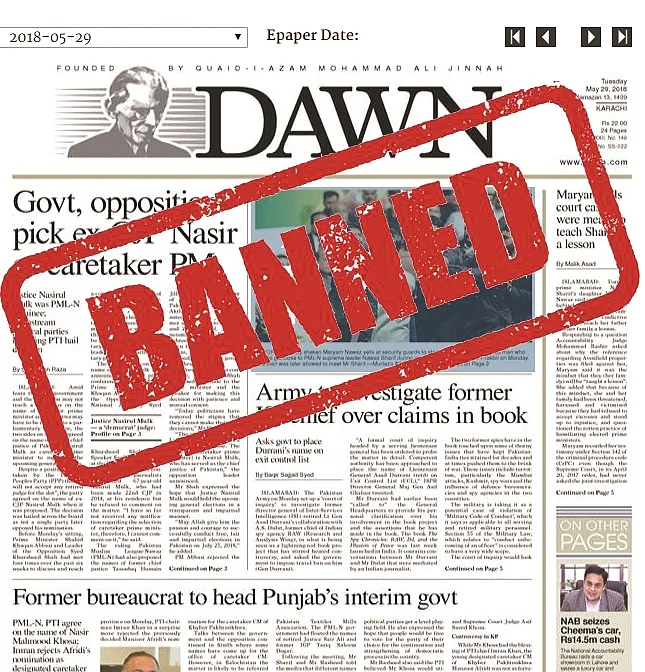Pakistan’s renewed tryst with a mottled ‘Dawn’
Military’s crackdown on a newspaper, founded by Mohammad Ali Jinnah in Daryaganj in Delhi, is being condemned. Human Rights Council has called the Press Council’s notice to Dawn as harassment

Ye daagh daagh ujala, ye shab guzeeda seher
Wo Intezar tha Jiska, ye wo seher to nahin
Faiz Ahmed Faiz had described the mottled dawn that Pakistanis had not bargained for in their quest for freedom but were forced to grudgingly accept.
The tussle between hope and reality has come since the country’s inception as mass movements and in military crackdowns. It has come in the form of assassinations, and presents itself in the form of a resolute press.
It is not unusual for the military establishment in Pakistan, though they are not the only pillars of the state to do so, to feel the heat from the media. And it is not unusual for the media to suffer the familiar harsh consequences of its vigil.
Committee to Protect Journalists (CPJ) too has called for an immediate halt on severe restrictions placed on the distribution of Dawn in Pakistan. Distribution of the newspaper has been disrupted in many parts of the country in recent weeks, Dawn editor Zaffar Abbas told CPJ
Now that the general elections have been announced for July, it may not be an exaggeration to see a link between the harsh if unofficial crackdown on Dawn, the newspaper founded by Mohammed Ali Jinnah in Daryaganj in Delhi, and other media outfits that are perceived as independent and outspoken.
The Human Rights Commission of Pakistan has expressed concern over a notice served by the Press Council of Pakistan (PCP) on Dawn for what it called violating the Ethical Code of Practice by publishing an interview of former Prime Minister Nawaz Sharif. In his interview, Sharif had stated: “Call them non-state actors, should we allow them to cross the border and kill 150 people in Mumbai? Explain it to me. Why can’t we complete the trial?”
The former premier added: “We have isolated ourselves. Despite giving sacrifices, our narrative is not being accepted. Afghanistan’s narrative is being accepted, but ours is not. We must look into it.”
The commission noted: “There is no evidence to suggest that Dawn has undermined Pakistan’s sovereignty or integrity under the PCP Ordinance 2002 by publishing an interview with the former Prime Minister speaking on the record.”
The commission described such moves as harassment of the media. “Such curbs are tantamount to press harassment and only chip away further at the shrinking space for Freedom of Expression,” it said.
Committee to Protect Journalists (CPJ) too has called for an immediate halt on severe restrictions placed on the distribution of Dawn in Pakistan. Distribution of the newspaper has been disrupted in many parts of the country in recent weeks, Dawn editor Zaffar Abbas told CPJ.
It was reported on May 17 that distributors in Balochistan province were told not to distribute the newspaper because it ran an interview with Nawaz Sharif earlier in May.
According to a source who asked to remain anonymous for fear of retaliation, military guards in Lahore searched bundles of newspapers carried by salesmen to prevent copies of Dawn from entering military cantonment areas.
Distribution of the paper has also been disrupted in the parts of Sindh and Punjab provinces, Abbas said. There have been ongoing disruptions in many military cantonments since October 2016, when Dawn published an exclusive report on the state of civil-military relations, the editor said. “We believe it’s the right of the military or any institution to buy or discontinue any newspaper,” he told CPJ. “Our only objection was on stoppages of delivery to civilians living in such cantonments.”
Steven Butler, CPJ’s Asia programme coordinator, in Washington, D.C. slammed the silent assault on Dawn. ”Military authorities are plainly behind this block on the distribution of Dawn and they need to stop stifling access to information throughout the country. These censorship attempts are a grave threat to democracy and press freedom in Pakistan, especially as the country readies for a general election expected this summer.”
The Press Council of Pakistan—a media regulatory body made up of government, media, and union members—issued a notice to Dawn regarding the article for “alleged violation of the ethical code of practice,” pointing to a clause that calls on the press to avoid printing material that undermines Pakistan’s “sovereignty and integrity as an independent country,” according to The Nation. The Human Rights Commission of Pakistan and the Pakistan Federal Union of Journalists have both expressed concern over the Press Council notice, which they described as interference with right of the media to report the news.
As Pakistan prepares for elections in coming months, there have been ongoing reports of censorship on sensitive topics in the country, such as the Pashtun movement. In April 2018, CPJ documented the arbitrary suspension of Pakistani television channel Geo TV, which followed military displeasure over the station’s news coverage, according to the New York Times.
Faiz cautioned about the mottled dawn that Pakistanis never wanted. The warning included the assault on press freedoms in Pakistan.
Follow us on: Facebook, Twitter, Google News, Instagram
Join our official telegram channel (@nationalherald) and stay updated with the latest headlines
